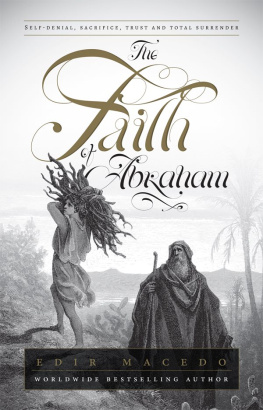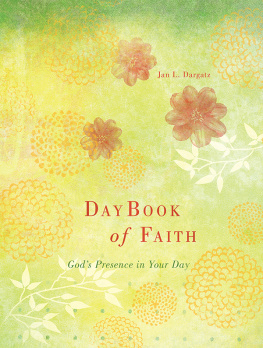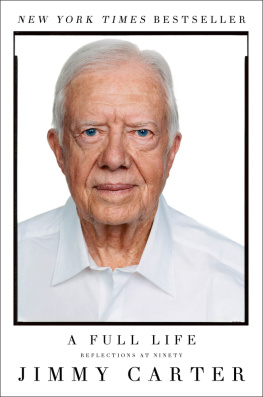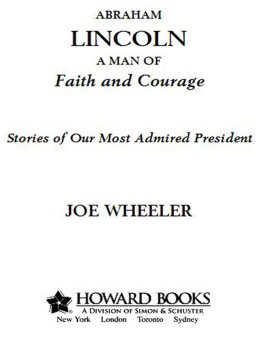Copyright 2001 Unipro Editora
No part of this book may be reproduced or transmitted in any form or by any means. Transgressors will be prosecuted according to the law.
Scripture taken from the Modern English Version. Copyright 2014 by Military Bible Association. Used by permission. All rights reserved.
General Coordinator: A. Lobato
Editor: Mauro Rocha
Design Coordinator: Paulo S. Rocha Jr.
Art Director: Rafael Brum
English Version: Renato Cardoso and Sandra Gouva
Editorial Assistant: Regina Dias
2nd edition
M141F
Macedo, Edir, 1945
The Faith of Abraham / Edir Macedo. Rio de Janeiro: Unipro, 2018.
ISBN 978-85-7140-839-5
1. Abraham (Hebrew patriarch). 2. Faith (Biblical doctrine)
I. Title.
CM- 222-11

Estrada Adhemar Bebiano, 3.610 Inhama
CEP 20766-720 Rio de Janeiro, RJ Brazil
TEL.: +55 21 3296-9300
www.unipro.com.br

The objective of this study is to lay the foundations to what we call beneficial faith, that is, a faith that brings benefits.
Most people have faith in God, but not everyone has achieved success in their faith simply because their faith lacks foundation. When faith is based upon the solid foundation of the Word of God, it has quality. And it is exactly this kind of faith that we can call quality faith a faith that promotes or brings a life of quality.
The lack of quality in faith is exactly the reason why most religious people do not obtain practical results from their faith, even though they have faith in God. Life depends on faith. But if a persons faith lacks quality, then their life will also lack quality.
We are going to take our father in faith, Abraham, as an example because the Lord Himself teaches us to look to Abraham (Isaiah 51:2). In other words, we should imitate him in faith and in obedience.
It was through his courage and boldness that he materialised the faith of the heart, when he offered his son Isaac.
Abraham had the privilege of being the first to receive the promise of God with an oath.
It is not according to the law that Abrahams descendants will inherit his blessings, but according to the same quality of faith in God that he manifested.
Because of the nature of his faith, Abraham became Gods friend and heir to all His promises.


Why did God choose Abraham? What moved Gods heart in this choice? The answer is faithfulness. Without a doubt, faithfulness was a remarkable characteristic in the life of this man.
Even though he lived in a pagan land, where promiscuity was an object of worship, Abraham remained faithful to his only wife. Sarah was loved and respected by him and she consequently responded to his faithfulness to the point of considering him as her lord.
Certainly, God saw that, if Abraham could be faithful to his wife even though she was barren, he would certainly be faithful to Him also as a servant! And here we see one reason for the difference between servants and servants, Christians and Christians.
Before a person is chosen, first he must offer himself up for election. The elect is the one who, having passed through the process of election, is approved. The Lord Jesus Himself said, Many are called, but few are chosen (Matthew 20:16; 22:14).
We could also understand this word as many are the candidates, but few are the elect. The choice of candidates for election requires that a person be, above all, faithful. If a person cannot be faithful to the one he sees, how can he be faithful to the one he does not see?
Gods promises are clearly directed to the elect, in other words, to those who have remained faithful until the end. Revelation 2:10 says, Be faithful unto death, and I will give you the crown of life.
For such who are faithful, it has been determined: They shall not build and another inhabit; they shall not plant and another eat; for as the days of a tree are the days of My people, and My chosen ones shall long enjoy the work of their hands (Isaiah 65:22).
Would a rich father bestow an inheritance to the son who is faithful or to the son who is unfaithful? Likewise, God cannot entrust His blessings to the hands of the unfaithful. Therefore, before someone can demand Gods faithfulness in fulfilling His promises, he must first examine whether he has been faithful to God in his Christian conduct.


After God elected Abraham in His heart, He called him and told him clearly: Go from your country, your family, and your fathers house to the land that I will show you (Genesis 12:1).
This was the first test of Abraham. He had to leave his homeland, his properties, his customs, his friends, in short, he had to leave everything behind.
His surrender to God meant separation from his familiar world. Gods divine plan demanded his total departure from that place. The Lord could not shape and mould him according to His will, while he was subject to the influences of that society.
Getting him out of there and teaching him to depend on his faith in the promises of God was fundamental for the creation of a strong, invincible, and unshakable nation.
On the other hand, going out into the desert without a map and without a clue where he was going was a true challenge to his faith. At first, God gave him no direction where he should start, let alone direction to the north, south, east or west.
First, he had to leave the place where he was, and only then the Lord would guide him. Abraham had to learn to depend on God to provide the daily bread, day after day, through the desert.
Similarly, the Lord Jesus teaches us, saying, If anyone will come after Me, let him deny himself, and take up his cross, and follow Me (Matthew 16:24).
But follow Him where? It doesnt matter! Whoever wants to follow Him doesnt need to know where. It is enough only to trust in His leadership. Christians live by faith, in other words, in the certainty that God will do exactly what He promises to do.
Ur was a city in Mesopotamia, the land of the Chaldeans, situated between the rivers Tigris and Euphrates. It was a prosperous, important and well-developed city.
Abraham needed courage and boldness to give no ear to his relatives and friends, but only to God. The Lord Himself would guide him through the desert and show him the Promised Land. The absolute certainty that God would fulfil what He had promised was the only evidence that would beat in his heart.



















